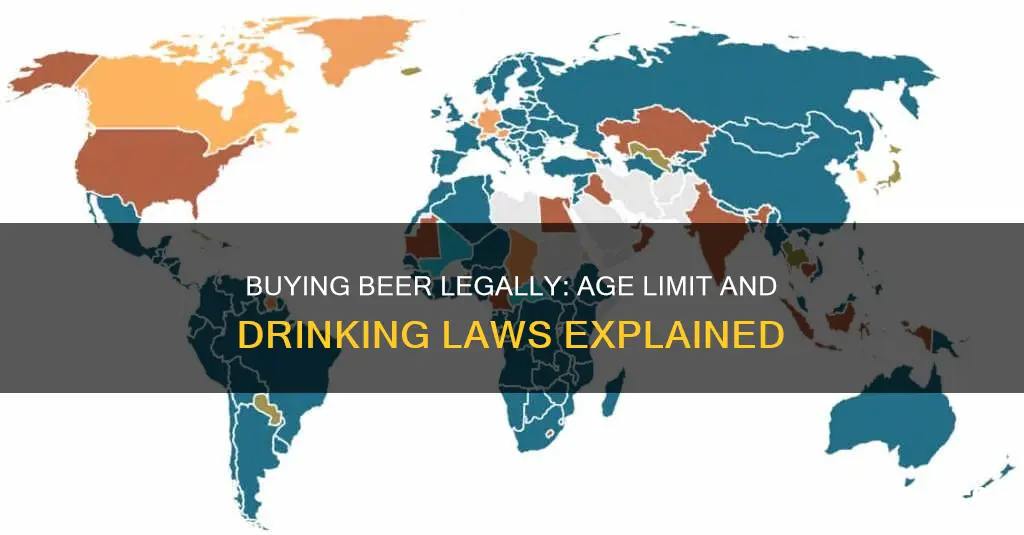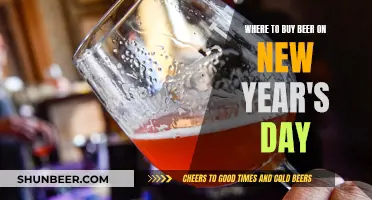
The legal drinking age in the United States is 21, but the question of whether 18-year-olds can buy non-alcoholic beer is more complex. Non-alcoholic beer typically contains less than 0.5% alcohol by volume (ABV), which is significantly lower than the 4-6% ABV found in traditional beer. While some states, like Ohio, allow 18-year-olds to purchase non-alcoholic beer, others, such as Oregon, West Virginia, and Wyoming, restrict its sale to those under 21. The laws vary across states, and retailers may also have their own policies, making it essential to check local regulations before attempting to purchase. This complexity arises because non-alcoholic beers are still regulated by the Federal Alcohol Administration Act, even though their alcoholic content is below the legal definition of an alcoholic beverage.
What You'll Learn

Non-alcoholic beer may still be restricted to under-18s
The legal drinking age in the United States is 21. However, this does not stop many people under the age of 21 from turning to non-alcoholic beers, which allow them to enjoy the taste of beer without the intoxicating effects. Non-alcoholic beers typically have an alcohol content of less than 0.5% ABV, which is significantly lower than traditional beers, which usually range from 4-6% ABV.
Despite having a negligible alcohol content, there are still laws around the purchase of non-alcoholic beers in the United States. The Federal Alcohol Administration Act regulates non-alcoholic beers, even though their alcohol content is below what is considered an alcoholic beverage. This is because any malt beverage is regulated by the FAA, which does not indicate an ABV minimum.
While the federal government has set the legal drinking age at 21, the individual states have the power to define what an alcoholic beverage is and set their own rules for the purchase and consumption of non-alcoholic drinks. This means that the laws around the purchase of non-alcoholic beer by minors vary from state to state.
In many states, minors cannot purchase alcohol but may be able to consume it under certain conditions, such as with the supervision or permission of a parent, guardian, or spouse over the age of 21. However, some states, such as Oregon, West Virginia, and Wyoming, restrict the purchase of non-alcoholic beer by minors for beverages with an ABV of 0.5% and above. On the other hand, Ohio is one of the states that allow the purchase of non-alcoholic beer by minors, as long as they are over the age of 18.
The laws and retailer policies around the sale of non-alcoholic beer to minors vary significantly across the United States, and it is essential to know the local regulations before attempting to purchase. While non-alcoholic beer may be a safer alternative to traditional beer, it is still important to understand the legalities around its purchase and consumption for those under the age of 21.
Buying Beer on Sundays: Brunswick County Laws Explained
You may want to see also

Alcohol-free beer often contains trace amounts of alcohol
Alcohol-free beer is often marketed as a healthier alternative to regular beer, or as a way to cut down on alcohol consumption. However, it's important to note that alcohol-free beer doesn't always mean it's completely free of alcohol. In fact, in the United States, brewers are allowed to label their beer as "non-alcoholic" even if it contains small amounts of alcohol.
The threshold for a drink to be considered "non-alcoholic" is typically 0.5% alcohol by volume (ABV). This means that alcohol-free beers can contain up to 0.5% ABV and still be legally sold as non-alcoholic. While this percentage of alcohol is not enough to cause intoxication or a hangover, it's important to be aware that these drinks are not entirely alcohol-free.
The amount of alcohol in alcohol-free beer can vary depending on the brand and brewing process. Some beers, like O'Doul's, contain up to 0.4% ABV per serving, while others, like Athletic Brewing Co., label their cans as "less than 0.5% ABV" to account for potential variations during fermentation. Even big brands like Heineken 0.0, Budweiser Zero, and Guinness 0.0, which market their products as alcohol-free, may contain trace amounts of alcohol.
The reason for this is that it is very difficult to remove all alcohol from beer. Brewers use different methods to reduce the alcohol content, such as controlled fermentation, dealcoholization through heating or vacuum distillation, or blending with non-alcoholic ingredients. However, these processes may not eliminate 100% of the alcohol, resulting in trace amounts remaining in the final product.
The presence of trace amounts of alcohol in alcohol-free beer is significant, especially for certain individuals. For example, people with alcohol use disorders or those in recovery may want to avoid alcohol-free beer as the smell and taste can trigger cravings and lead to a potential relapse. Additionally, pregnant individuals are generally advised to avoid any alcohol consumption to prevent fetal alcohol spectrum disorder (FASD). Since alcohol-free beers may contain some alcohol, they may not be a safe option during pregnancy.
Furthermore, the sale of alcohol-free beer to minors is a controversial topic. While most states in the US don't have age restrictions on the purchase of non-alcoholic beverages, some researchers argue that these drinks could be a gateway to alcohol for children. There are concerns that the similarity in taste, smell, and cultural experience provided by alcohol-free drinks could increase the likelihood of minors transitioning to alcoholic beverages. As a result, some retailers choose to set their own age limits and require ID checks for the purchase of alcohol-free drinks.
Last-Minute Beer Run: Christmas Eve Shopping
You may want to see also

US federal law prohibits alcohol sales to under-21s
In the United States, the legal drinking age is 21. This means that, in all 50 states, you must be at least 21 years old to buy beer or any other alcoholic beverage. This federal law, prohibiting alcohol sales to under-21s, is known as the National Minimum Drinking Age Act, enacted on July 17, 1984.
The Act requires all states to set their minimum age to purchase and possess alcoholic beverages in public to 21 years or lose 10% of their allocated federal highway funding. As of July 1988, all 50 states and the District of Columbia had complied with this legislation, although some states, like Louisiana, took longer to resolve complicated legal situations.
While the federal law sets a minimum drinking age, individual states have the power to regulate intoxicating liquors within their jurisdiction. As such, laws pertaining to the production, sale, distribution, and consumption of alcohol vary across the country. For example, some states allow those under 21 to drink for religious purposes, while others permit underage drinking in private residences under parental supervision.
The laws surrounding non-alcoholic beverages, which typically contain less than 0.5% alcohol by volume, are less clear. While most states don't have age restrictions on these drinks, some retailers choose to restrict their sale to those under 21. This is because non-alcoholic beverages are still regulated by the Federal Alcohol Administration Act, which applies to any malt beverage, regardless of its alcoholic content.
The debate around age restrictions for non-alcoholic drinks is ongoing, with some researchers arguing that these beverages could act as a gateway to drinking for minors. However, others believe that self-regulation by retailers is sufficient and that government involvement is unnecessary.
Root Beer Popsicles: Where to Buy This Summer Treat?
You may want to see also

Individual US states have varying alcohol laws
In the United States, the legal drinking age is 21. However, individual US states have varying alcohol laws, with 45 out of 50 states having exceptions to the federal law. These exceptions include religious activities, educational purposes, lawful employment, parental or spousal consent, law enforcement purposes, and medical reasons.
For example, in 30 states, individuals can work as bartenders at the age of 18, while in 15 states, the minimum age for bartending is 21. The laws also differ when it comes to serving drinks, as the minimum age for servers may be different from those pouring drinks behind the bar. In North Carolina, for instance, individuals can serve beer and wine at 18 but are not allowed to serve liquor until they turn 21.
Some states allow minors to drink alcohol in licensed establishments, such as bars or restaurants, if they are accompanied by a parent or guardian. For instance, Texas and Wisconsin have such laws in place. On the other hand, states like Illinois strictly enforce the law against possession or consumption of alcohol by anyone under 21, except when the minor is at home with a parent or guardian.
The laws regarding parental consent also vary widely across states. While some states only allow minors to consume alcohol in the private home of a parent or guardian, others permit consumption in licensed establishments as long as the parent is present and gives permission.
In addition, a few states have exceptions for underage individuals employed in law enforcement, allowing them to buy and consume alcohol as part of their undercover work or research.
The complexity of alcohol laws in the US is further compounded by the fact that local jurisdictions, states, and federal regulations all play a role in determining who can distribute, buy, possess, and consume alcohol within a particular state.
Best Beer Buying Spots in New Jersey
You may want to see also

Alcohol-free beer may act as a gateway to drinking for kids
In most countries, the legal drinking age for alcoholic beverages is 18 or 21. However, the laws regarding the purchase and consumption of non-alcoholic or alcohol-free beer vary and are often less clear. While these drinks typically contain less than 0.5% alcohol by volume (ABV), they are still regulated by laws that govern alcoholic beverages, such as the Federal Alcohol Administration Act in the United States. This creates a grey area, as some retailers and pubs choose to restrict their sale to minors to avoid any potential legal issues or negative perceptions.
The topic of non-alcoholic beer and its potential impact on minors has sparked debate among experts and parents. Some argue that non-alcoholic beer could act as a gateway to drinking for kids, normalizing drinking behaviour and increasing the risk of future alcohol-related issues. They draw comparisons to candy cigarettes and the recent rise of e-cigarettes among younger generations. These concerns are heightened by the fact that non-alcoholic beverages often mimic the taste, smell, and branding of their alcoholic counterparts, creating a sense of familiarity that could lead to an increased likelihood of purchasing alcoholic products in the future.
On the other hand, some parents believe that offering non-alcoholic drinks in moderation and appropriate contexts, such as family celebrations, can help normalize responsible drinking habits. They argue that non-alcoholic beverages provide a healthier alternative to alcohol and can be especially beneficial for busy professionals and parents who want to unwind without the negative side effects of alcohol. Additionally, non-alcoholic drinks can cater to those looking for lower-calorie, carb, and sugar options.
While there is no definitive evidence that non-alcoholic drinks have led to increased alcohol consumption among minors, the lack of consistent age restrictions across states and countries has prompted health researchers to call for clear and consistent age limits. They emphasize the potential risks of leaving the door open for marketing non-alcoholic beverages to children and the need to get ahead of any potential public health issues.
To address these concerns, some retailers and pubs have implemented their own age restrictions, requiring identification for anyone who appears under a certain age, even when purchasing non-alcoholic drinks. This "Challenge 25" policy, for example, helps avoid confusion and ensures that staff do not inadvertently sell age-restricted products to minors.
Fuller's Beer: Where to Buy and What to Know
You may want to see also
Frequently asked questions
No, you must be at least 21 years old to buy beer in the US.
It depends on the state. While federal law doesn't prohibit the sale of non-alcoholic beer to minors, some states do have age restrictions.
No, the legal drinking age in the UK is 18, but many supermarkets and pubs will ID anyone who looks under 25.
In certain states, minors can legally consume alcohol with the consent of a parent or guardian who is over the age of 21.







